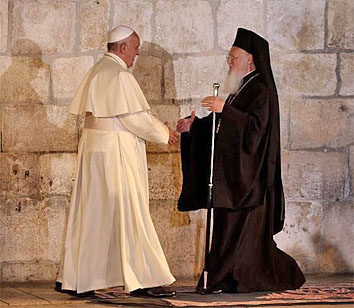 |
|
http://www.theatlantic.com/ The Pope's Holy-Land Trip Wasn't About the Israeli-Palestinian Conflict Francis's visit was fraught with tensions, but its focus was clear: uniting the world's Christians.
On the second day of his pilgrimage to the Holy Land over the weekend, Pope Francis got in trouble. Several media outlets called it a "propaganda war": The pontiff made an unscheduled stop to pray at the wall that divides Jerusalem from Bethlehem, which is in the West Bank; the following day, Israeli Prime Minister Benjamin Netanyahu accompanied him on yet another unscheduled visit, this time to an Israeli memorial for victims of terrorism. There were endless photo ops—a competition to capture the pope's most politically poignant moment: praying at the Western Wall, praying on the banks of the Jordan River, praying before a Palestinian security checkpoint covered with Arabic graffiti. But even though Francis met with Netanyahu and Palestinian Authority President Mahmoud Abbas, his trip wasn't about the Arab-Israeli conflict. It was about Christians. They're the forgotten stakeholders of Jerusalem: People like the nuns who live on the Via Dolorosa, the road Jesus walked to his crucifixion; the Franciscan priests who maintain the Garden of Gethsemane, where Jesus prayed before his death; and, perhaps most importantly, the shrinking number of Arab Christians who live in Israel, the Palestinian Territories, and surrounding countries. On the Vatican-run website dedicated to the pope's trip, there are several sections about the persecution of Palestinian Christians, emphasizing that they are "faced by an exclusivist Islamic movement that often refuses to recognize Christians as co-citizens with equal rights, equal obligations, and equal opportunities." In an audience with members of the Muslim community, including Muhammed Hussein, the grand mufti of Jerusalem, Francis indirectly echoed this concern. He spoke of the role of Abraham in Christianity and Islam and the "fraternal dialogue" between the two faiths, but he closed with a rallying cry that seemed like an expression of mild disapproval: "May we respect and love one another as brothers and sisters! May we learn to understand the sufferings of others! May no one abuse the name of God through violence!" The remarks are particularly striking in comparison with the comments he made in an audience with the two chief rabbis of Israel, David Lau and Shlomo Amar. Again, he spoke of dialogue and kinship, but he emphasized the shared theological heritage of Jews and Christians. "On the part of Catholics, there is a clear intention to reflect deeply on the significance of the Jewish roots of our own faith," Francis said. "I trust that, with your help, on the part of Jews too, there will be a continued and even growing interest in knowledge of Christianity, also in this holy land to which Christians trace their origins." His language was an explicit allusion to Nostra Aetate, the Church's first doctrine on people of other faiths, which was formulated during Vatican II in the mid-1960s and significant for its mostly conciliatory posture toward Jews. He emphasized the "bond" between Jews and Christians and the importance of working together to create peace and "oppose every form of anti-Semitism and all other forms of discrimination." It was a strong signal of his desire to connect with the Jewish people, but it wasn't necessarily a conciliatory gesture toward Israelis; the pontiff chose to make his first stop in the West Bank, and in his meeting with Abbas, he chastised both Israelis and Palestinians, calling their territorial conflict "unacceptable." The centerpiece of the pope's trip also had nothing to do with the politics of Palestinian statehood. The Vatican emphasized that the purpose of the journey was a meeting between Francis and Patriarch Bartholomew, the archbishop of Constantinople and primary leader of Eastern Orthodox Christians. This get-together also had Vatican II-era roots; 50 years ago, around the time the Second Vatican Council was closing, Pope Paul VI spearheaded a meeting with Patriarch Athenagoras, marking the first time a Roman Catholic pontiff had met with an Eastern Orthodox patriarch since the Great Schism between the two denominations in 1054. The language of the declaration signed by Francis and Bartholomew is all about unity and reconciliation. "Our fraternal encounter today is a new and necessary step on the journey towards the unity to which only the Holy Spirit can lead us," they said. "Theological dialogue does not seek a theological lowest common denominator on which to reach a compromise, but is rather about deepening one’s grasp of the whole truth that Christ has given to his Church." Although their declaration touched on many spiritual themes, including the importance of the family and stewardship of the earth, one stuck out: the prevention of Christian persecution. "We express our shared profound concern for the situation of Christians in the Middle East and for their right to remain full citizens of their homelands," they said. "We especially pray for the Churches in Egypt, Syria, and Iraq, which have suffered most grievously due to recent events." Over and over again throughout his trip, the pope repeated these themes: unity with those of theological kinship, condemnation of the persecution of Christians, dialogue as a means of preventing violence. All of this underscores the fact that the pontiff isn't just a politician or head of state, taking a trip to Israel to make heartfelt but abstract statements about finding peace in the Middle East. He's an advocate for Christians, and more broadly, the theological narrative of Christianity. Jerusalem is a big part of this: Christians believe the city is where the second coming of Jesus will take place. As Francis travels the world, he will be journeying not as a public figure or diplomat, but as a pilgrim, "a person who makes himself poor and sets forth on a journey," as he explained it. The pope may earnestly pray for peace, but in terms of his own peacemaking, his eye is trained on the Church.
|
|
|